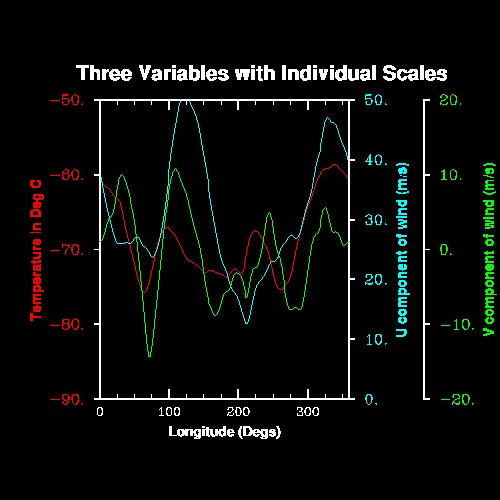XyPlot example 16


This example is created using HLU C library calls, HLU FORTRAN library
calls, or NCL. It demonstrates how to create an XyPlot that has three
different y axes. The names of the source files for this example are
xy16c.c, xy16f.f, and xy16n.ncl.

Discussion
This example reads an ASCII file with 4 variables: lon, u, v, and t.
The variables u, v, and t are plotted with 3 separate y axes.
In this example, each of the three variables are assigned their own Y
axis and scales by creating three distinct XyPlot objects. The first
object is given a full grid and has its Y axis scale on the left. The
second object has no grid and the Y axis scale on the right of the
first grid. The third object's viewport is made wider than the first
two and its X axis is scaled so that the data end at the right grid
boundary of the first object. Only the Y axis on the right is drawn
for the third object. The curves and the Y axis scales are color
coordinated so you can tell which curve goes with which scale.
There is no resource file with this example.
The HLU C program that generates this plot is called
xy16c.c.
The HLU FORTRAN program that generates this plot is called
xy16f.f.
The NCL script that generates this plot is called
xy16n.ncl.
The data for this plot is from a file called "xy.asc".
The examples are installed in the following locations:
- $NCARG_LIB/ncarg/hluex/xyplot/xy16c.c
- $NCARG_LIB/ncarg/hluex/xyplot/xy16f.f
- $NCARG_LIB/ncarg/nclex/xyplot/xy16n.ncl
The ASCII data file is installed in the following location:
- $NCARG_LIB/ncarg/data/asc/xy.asc
You can copy this example and run it by typing "ng4ex xy16c", "ng4ex
xy16f", or "ng4ex xy16n". A copy of the source file will be placed in
your current working directory. The source code will be compiled and
automatically run for you.
Quick Start Guide Control Panel
NG4.1 Home, Index, Examples, Glossary, Feedback, QSG Contents, QSG WhereAmI?
$Revision: 1.6 $ $Date: 1999/03/23 21:15:25 $

